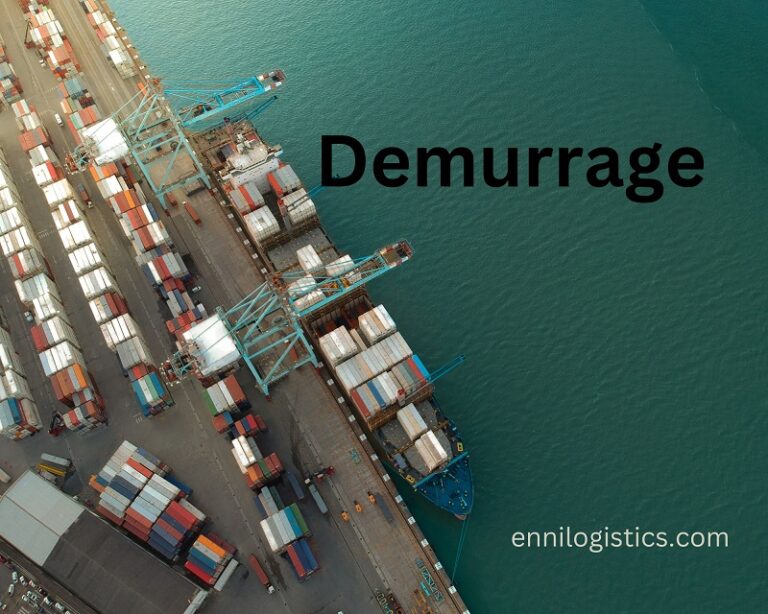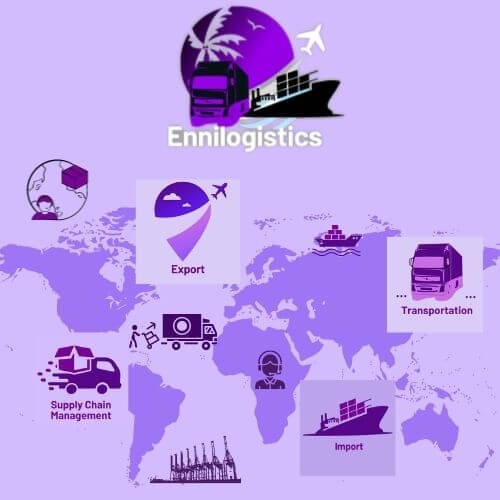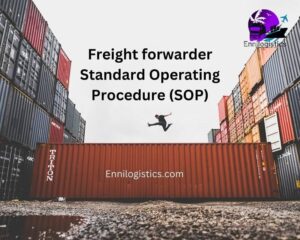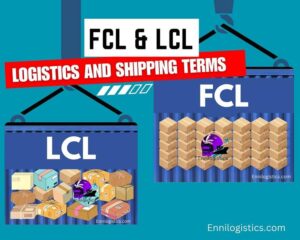When you are dealing with foreign trade you can hear the word of demurrage. Have you ever heard the word demurrage? Do you know the exact meaning of the demurrage? Most people have heard and used the word demurrage in international trading, but they don’t know the real meaning of demurrage and there is no clear understanding.
If you are doing import or export you should be aware of the concept and meaning of the demurage. Because it is an additional charge for your shipment. Ultimately you have to bare this cost directly or indirectly for your shipment. Here we are going to explain the demurrage in the shipping industry with simple and easy examples.
Meaning of Demurrage
History said that the term demurrage came from the French language, from the word “demeurage”. Demurrage can be used for both air transport and sea or ocean transportation. In world trade 90 percent of the cargo is moved by ocean transportation so demurrage is most popular in the shipping industry. Here I’m going to explain demurrage related to the shipping industry.
The actual meaning of demurrage is the usage of a port or terminal storage facility when exceeding the number of free days, you have to pay additional charges as a penalty. Generally, In port tariffs, it’s called occupation chargers for demurrage. These occupational chargers vary from port to port and as well as cargo type, LCL or FCL container size, and others.
These occupational chargers when necessary situations pay to the ports authority by freight forwarder or importer when clearing the shipment. If the freight forwarder or allocated customs house agent pays occupational charges as demurrage after that claim all the chargers from the actual customer or cargo owner/importer.
For FCL shipment needs to pay yard chargers as demurrage fees to the relevant port authority.
When it’s come to the LCL shipment, debuffing or unpacked in the warehouse and it’s stored in the warehouse until the goods are cleared.After the free days need to pay warehouse storage chargers as a demurrage fee for LCL shipment.
Basically, we can explain demurrage, which is a penalty charge for import and export goods for additional usage of spaces(container yard or warehouse) for storage in ports or terminals when exceeding the free days.
Before further explaining demurrage, it is useful to know what is ” free days”.If you have to clear idea of free days. Then you can understand demurrage easily.
What is ” free days”?
For import cargo: Free days
The simple meaning of free days is the time period importer can clear the shipment freely. It means without paying storage fees for the port’s authority.
Free days are allocated by the relevant port/terminal as a time period to clear the shipment from the date of unloading or de-stuffing the cargo from the vessel. During this free time period, the importer can clear the shiment free of charge. Free days are benefits to the importer. But in case the importer is not capable to clear the shipment from the port he is liable to pay demurrage charges for extra usage of port storage facilities.
In the shipment clearing process at the port, days are calculated by working days only. Not counting holidays. So free days are counted as working days only.
Free days vary from port to port and also it is depending on the cargo type.
For example, Sri Lankan ports authority Tariffs free days mentions below,
Free days for Import cargo-Sri Lankan port’s authority: Sourced by: https://www.slpa.lk/port-colombo/tariff
| Cargo Type | Free days |
| Normal Cargo-Import | 3 days |
| Vehicle-Import | 3 days |
| DC cargo (Dangerous cargo)-Import | 48 hours |
For Export cargo: Free days
For the export allowing a storage facility in the portion free of charge called free days are different from the import process. Next, I’m going to explain export “free days” at the port.
Most of the countries are offering a higher number of free days when compared to import procedure free days due to the purpose of promoting exports. The amount of free days is different from country to country and port to port while the type of the shipment (LCL or FCL) and type of cargo that expect to export.
Export free days are counted from the receipt to shipped to the vessel. Same as import free days , days are counting only working days or clear days without holidays.
For example, free days of export shipment in Sri Lankan ports authority offer a different number of days for different cargo types.
sourced by Sri Lankan port’s authority tariff guide:https://www.slpa.lk/port-colombo/tariff
| Cargo Type | free days |
| Normal cargo -Export | 7 days |
Next. going to explain demurrage for bulk shipments and containerized shipments.
In the shipping industry meaning of demurrage, we can explain in two ways. Bulk shipment and containers can be applied demurrage in different ways.
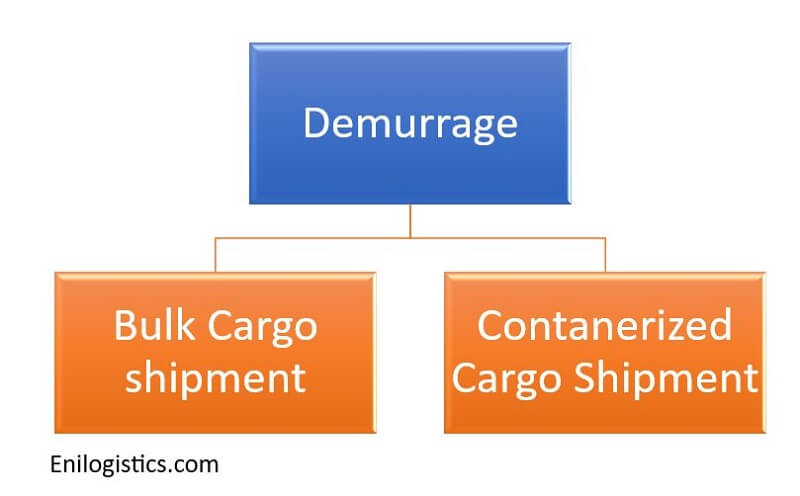
The meaning of demurrage – for bulk cargo shipments
The meaning of demurrage is If any case exceeds the agreed time of the loading or unloading process charter party company needs to pay the shipowner a penalty.it‘s called demurrage.
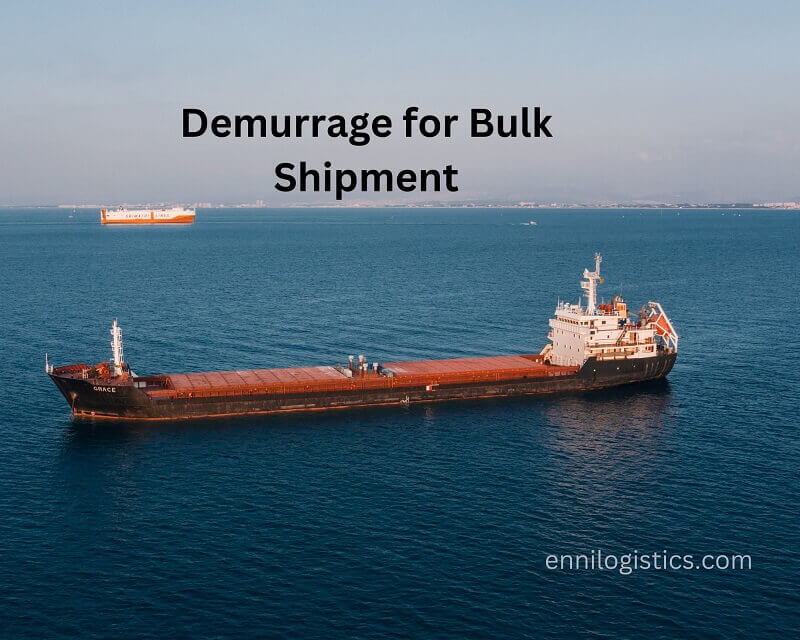
Bulk cargo shipment means at one time full of the ship is carrying one type of cargo as bulk. There are ships specialized for carrying bulk cargo.
In this case, firstly charter and shipowner make an agreement regarding demurrage.
Normally charterer is doing an assessment regarding loading and unloading time for a specific cargo. For this assessment charter need to consider a lot of factors that are affecting to loading and unloading process. According to cargo type, available loading and unloading equipment at the port or terminal, labor availability, and other relevant factors that are affecting to loading and unloading process. This prior assessment charter can be identified as an estimated time period for the loading and unloading process. Based on the assessment charterer and shipowner come to an agreement regarding the demurrage rate and allocate a specific time period(free days) for the loading and unloading process at the ports and freight for the relevant voyage.
If the ship charterer is able to manage the ship’s operation at the pre-agreed time period according to their agreement. There are no applied demurrage or despatch chargers.
But here are two things that will be occurred when the charterer has failed to do their ship loading and unloading process at the pre-agreed time.
If exceed time in the contract, the charter is liable to pay demurrage as a penalty charge to the shipowner according to the rate of the agreement and counted days of late.
Another thing is if the charterer finished the loading and unloading at the port before the agreed time. It is an advantage for the ship charterer. But most of the time charterer is not lucky to get the benefit of despatch payment from shipowners for early operations of the ship due to unavoidable situations at the port or terminal.
In the container, shipping trade applies demurrage a little bit differently from bulk cargo shipments.
The meaning of demurrage – for containerized shipments
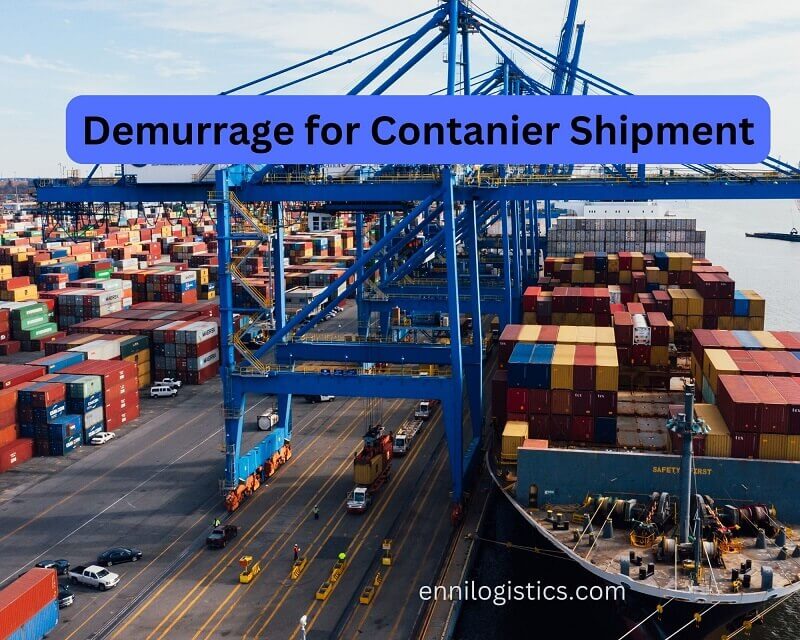
For container shipments we are generally called FCL, they also have free days for clear or load to the vessel at the port. After the free days which is allowed by the relevant port authority charge demurrage as a penalty for additional usage of the port’s container yard until the clearance of the shipment. This common charge is paid by a freight forwarder, shipping line, or direct import/exporter.
When you hire a freight forwarder, demurrage is a hidden and indirect cost to the importer or exporter. Because freight forwarders pay occupational chargers to the port authorities and bill the customer as additional chargers or additional storage chargers. In this scenario importer or exporter pays a demurrage charge indirectly.
If your shipment is LCL, your freight forwarder pays demurrage or occupational charges for fully consolidated containers (FCL) to the port. Then they will bill a portion of the demurrage charge for your LCL shipments.
However, demurrage is an unavoidable and unpredictable cost to an importer or exporter due to unavoidable reasons such as the nature of gods, port strikes, loading and unloading equipment failure, or insufficient facilities at the port.
Here there are some situations you can avoid demurrage charges such as a well-planned documentation process. It can avoid delays related to documentation failure during the customs clearance process.
I think it is better to identify causes or reasons for the demurrage. And you can prepare to avoid demurrage to some extent.
When talking about container shipping, shippers need to lease or buy containers for door-to-door operations. Most shippers don’t have their own containers due to the high cost and usage of the containers. And also there are more container leasing companies and shipping lines available in the market. So it is more flexible and lower cost to use carrier-owned or leased containers for the purpose of transporting goods at specific times.
If you use the carrier’s owned containers you are liable to pay demurrage and detention fees for the delays in the container shipping operation.
But if you use SOC or shipper-owned containers you are released from the paying demurrage and detention for all the delays occurring at the port and out of the port or terminal.
Next, we move on to demurrage chargers for import containers.
Demurrage for import containers
As mentioned above demurrage is an extra charge or punishment charge for exceeding free days at the port storage usage. When this charge comes to the port’s tariff it is called occupation chargers. For importing a containers occupational chare is vary with the cargo type and container type. For an example, you can refer SLPA tariff guide, which is mentioned below,
sourced by SLPA tariff-https://www.slpa.lk/port-colombo/tariff
| Cargo types | Per Day or part there of | ||
| Per FCL Container (US $) | |||
| 20’ | 40’ | Over 40’ | |
| Normal Cargo-Import after 3 days of free days (chargers applied from 3 days + to 7 days | 8.00 | 16.0 | 18.0 |
| DC cargo – (Dangerous cargo)-Import-After 48 hours free time (chargers applied 48 hrs. + to 7th days | 28.00 | 5.00 | 62.00 |
like as above table country-to country and port-to-port varies with the demurrage chargers according to the size of the containers.
Demurrage for export containers
next, we will discuss an export scenario of the demurrage for containers. When the export process container needs to transport within the export free time period of storage. Most of the time it is allowed to come before 7 days of vessel departure. Free time allocation is also different from country to country and port to port.
If you are unable to carry the container before the vessel’s departure, you have to wait for the next departure of the vessel which is suitable for your shipment destination. So you need to use the port’s container yard or storage facility for your shipment. In this scenario, you have to use additional days of storage facilities at the port or terminal, for that port’s authority to charter the occupation fee or demurrage for your export container.
For the export demurrage chargers of containers are also different from the size of the container.
May you like to Read,
7 Reasons For Demurrage? Simple And Easy Explanation
What is Demurrage? Detention / Laytime / Despatch
Powerful Way To Avoid Demurrage With Free Checklist
Do you know the Secrets of cargo containerization in 2023?
Do you know the main types of cargo?
Shipment Arrival Notice/notification
Port Charges and dues in Shipping Industry
Master Bill Of Lading(MBL) And House Bill Of Lading(HBL): Everything You Need To Know
Proforma Invoice And Commercial Invoice: Everything You Need To Know

